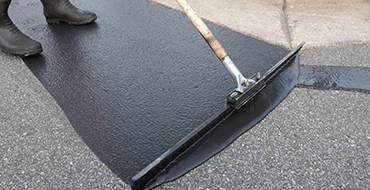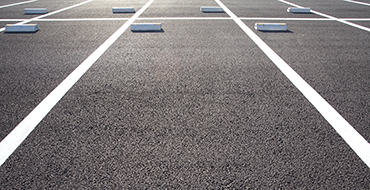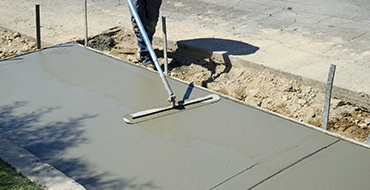Alaniz Construction
Sealcoating Services
Asphalt Sealcoating is the most effective way to protect and extend the life of your businesses asphalt investment. Studies have shown that when an asphalt sealant is applied from the beginning and throughout the life of an asphalt pavement it can greatly increase – even double – its life span. This can save your business tens of thousands of dollars over the course of its life, and keep your property looking its best.
Alaniz Construction has over 30 years experience in the installation, maintenance, and repair of asphalt pavements. The quality workmanship and commitment to our customers we offer has made us the most trusted name in asphalt sealcoating in the Bay Area.
Our Services
Seal Coating is a key element of pavement maintenance because it slows pavement deterioration and protects your pavement. When seal coating, we use SEALER exclusively to help extend the life of the pavement. For maximum protection, Seal Coating needs to be applied on a regular basis, approximately every 2 to 3 years.
Alaniz Construction recommends sealcoating application for all asphalt surfaces, sealcoating protects and maintains the life of your asphalt and should generally be done every 2-4 years depending on traffic conditions and weather. The ideal time to seal a road is when deterioration is first discovered; thus saving expensive patching or repaving. Alaniz Construction only uses the highest quality sealants and the latest sealant spray equipment to apply the proper coatings to revitalize and preserve your asphalt investment.

Advantages of Sealcoating:
Outstanding toughness and durability
Flexibility at all temperatures
Fast drying to rich, black color
Excellent resistance to fuel, oil and chemicals
Fills minor voids and provides uniform texture
Stops pavement degradation
Preserves asphalt oils in the pavement
Easy to clean and maintain
Highly cost effective
Signs You Need Sealcoating:
Asphalt is fading from black to grey.
Small cracks are showing.
Surface sand is wearing off revealing rock below.
Sandy deposits are collecting in the corners of your lot.
Prevents Water Damage
On an unsealed asphalt surface, water will seep into the asphalt pores. Water will erode the asphalt surface causing cracks and potholes to form. If water freezes in porous cement, it will expand and cause cracking.
Defends Against Chemical Damage
Motor oil and other vehicle fluids can saturate and break down asphalt surfaces. Bitumen is the active binding agent in asphalt cement and is made of a crude oil by-product. Motor oil will absorb the bitumen, which will dissolve its binding properties. potholes and erosion.
Protects From Sun Damage
The UV rays from the sun will oxidize the asphalt cement causing it to lose its binding properties. Accelerated oxidation will create loose gravel at the asphalt surface, and will break down the pavements thickness.
Why Asphalt?
Benefits of Asphalt
Asphalt is Green!
You can be proud that your asphalt paving project is a green choice. Asphalt Pavements are 100% recyclable.
Chances are pretty good that the asphalt on your asphalt paving project contains reclaimed asphalt pavement or RAP. RAP is old asphalt that has been milled off of pavements that have reached the end of their service life. The RAP is crushed and blended into new mixes. Almost all asphalt plants have RAP feeders which meter the material into the plant.
By reusing the asphalt binder in the RAP, less virgin asphalt (and thus less petroleum) is needed. Reusing the rocks means a reduced need for mining aggregates. Virtually all of the 18 billion tons of asphalt currently on U.S. roadways will be available for future generations to re-use.
Improvements in asphalt plant fume collection systems called “bag houses” have steadily reduced dust emissions by 97% since 1970. Warm Mix Asphalt (WMA) is especially green—it lowers energy needs as well as emissions.
Noise pollution is a growing concern in many residential and urban areas. Your asphalt paving project will have 3 to 9 decibels less noise than a concrete (PCC) pavement. Researchers have found that reducing decibels from 76 to 73 has the same effect as either reducing the traffic by half or doubling the distance from the source of the noise.
Economical
Not only is the initial cost of your asphalt paving project less than a cement concrete project, but the long term costs of maintenance and eventual rehabilitation are less too. Paving and traffic return occurs in a matter of hours, rather than days or weeks. The user-delay costs associated with the shorter work time means a tremendous savings for the traveling public and shipping businesses. Researchers have found that bumpy roads cost drivers considerably more in vehicle repair costs—in one study fuel costs were 4.5% higher; your smooth, asphalt paving project can reduce these costs, too.
Paving is Versatile
You have many options for your asphalt paving project. Not only is your pavement flexible, but your options are too.
- Using staged construction, you can build your pavement structure over time, as your funds allow and as traffic loading increases. Beginning with a good, stabilized base, you can add asphalt layers as needed.
- Your paving project can be done at night or other off-peak traffic times, with minimal disruption to traffic.
- On existing roads in need of maintenance, you can add more layers, or mill off some of the aged pavement and replace it with new asphalt (mill and fill) to keep the same elevation. This is especially important where there are curbs or for clearances under bridges and overpasses.
- You can even recycle your aged, cracked asphalt road in-place.
- Asphalt paving is ideal for streets, highways, pathways, parking lots, industrial sites, recreational trails, agricultural uses and even
corrective and preventive maintenance on concrete (PCC) pavements. - By using a planned sequence of low cost preventive maintenance treatments, your asphalt paving project can be a pavement that lasts for many, many years.
Paved Roads Are Safer Roads
Your asphalt paving project will be smoother than other alternatives—it won’t have the ka-thump, ka-thump, ka-thump of jointed pavements. It will be more skid resistant (higher friction number) because it uses hard, durable aggregates. With good drainage and a good mix, your asphalt paving project will be an excellent, safe, all weather driving surface. If you choose one of the new textured (open-graded) surfaces (friction course), your asphalt paving project will also reduce the amount of splash and spray during rainstorms, greatly improving driver visibility. The black surface also helps in the visible delineation of lanes and pavement markings.
During construction, shorter lane closures also mean greater safety for workers and vehicles traveling through the work zone. (To say nothing of the stress associated with long, long traffic delays in work zones.)
To Pave or Not to Pave
There are 1.3 million miles of unpaved roads in the US, and many more unpaved lanes at construction sites and quarries. Should these be paved? Some argue that it would cost too much to pave and maintain these roads. Unpaved roads mean dust (poor air quality and poor visibility) and dirt in dry weather, and slippery, muddy and unsafe roads in wet weather. Engineers estimate that a single vehicle traveling at 30 mph introduces 4½ pounds of dust into the air for each mile traveled on a gravel road. Rural and commercial entities spend significant sums periodically re-grading unpaved roads. There are many reasons to pave these roads, and asphalt is the most economical paving solution. Some neighborhood associations have self-taxed and pooled their resources to pave their roads.
Benefits of paving:
- Reducing gravel loss and sediment runoff
- Eliminating airborne dust
- Preventing the safety hazards of mud
- Keeping the gravel in place, reducing rutting and potholes
- Reducing dust-related health problems and cleaning costs
- Improving waterproofing and road protection
- No leaching of chemicals into soil or water
- No polluting the air with volatile road oils
- Improving quality of life and property values for those working and living next to your asphalt paving project
We all appreciate a smooth ride, but you may not be aware of the many cost, longevity and technical advantages that the smoothness of your asphalt paving project will provide.
A Vicious Cycle
It’s a continuing problem. A rough pavement results in cars and trucks “bumping” the pavement more. More “bumping” causes more pavement damage. And so on, and so on, and so on. You probably already know that asphalt pavements are smoother than concrete pavements, but the proof is that asphalt pavements have more stringent requirements for smoothness than concrete ones—because they can. By building a smooth surface, your asphalt paving project will stop this cycle, resulting in lower maintenance costs, lower vehicle operating costs, fewer customer complaints and a longer lasting project.
Hint: Reputable contractors know the value of pavement smoothness, and they know and use the quality techniques and construction practices to achieve it. Be sure that you select such a contractor for your asphalt paving project.
Qualifying Smoothness
How smooth is smooth? Engineers have found the best way to quantify smoothness is by measuring the roughness—the amount of vertical dislocation over a given length of pavement. One of the most common measurements is the International Roughness Index (IRI), which is specified by the Federal Highway Administration and State DOT’s. IRI is a measure of pavement roughness over a defined pavement length. It is usually expressed as inches per mile or meters per kilometer. An IRI of less than 60 inches/mi is generally considered a “good” pavement for an asphalt pavement. Most road owners use some type of rating system (Present Serviceability Index-PSI or Pavement Condition Index—PCI or Pavement Quality Index—PQI) to determine pavement quality, and IRI (or some other roughness parameter) is one of the inputs to determine that index. Other inputs include cracking, patching and rut depth. The PSI scale ranges from 0 through 5, with 5 representing the highest level of serviceability. New asphalt pavements typically have PSI values between 4.0 and 4.5. Pavements typically need resurfacing when the PSI value drops between 2.0 and 2.5.
Benefits of Smoothness
A 1991 study showed a positive correlation between smoothness and long-term pavement performance. Data from 10 years of performance on 400 different pavements demonstrated that initial smoothness is related to both long-term roughness and long-term cracking; as initial pavement smoothness decreases (initial roughness increases), the roughness after 10 years increases and the percentage of cracking after 10 years similarly increases. The study also concluded that pavements that have higher initial smoothness result in maintenance savings as much as $1,200 per mile when the initial PSI is increased from 4.0 to 4.5. Most road agencies acknowledge this, adding specifications for IRI for new surfaces, and even sometimes give bonuses for smoothness. As any driver will attest, smoothness also means greater safety.
The Costs of Roughness
Researchers have documented that high IRI’s decrease the fuel efficiency of vehicles, cause higher consumption of oil, increase tire wear, and increase costs of maintenance and depreciation. For example, fuel consumption increases about 10 percent for cars and 15 percent for buses if the PSI drops from 4.5 to 2.5. Maintenance and tire costs can triple, and oil consumption will nearly double. The net cost increase has been calculated to be $250-300 per 10,000 miles of driving.
The bottom line is that smoothness equals lower vehicle maintenance costs and pavement maintenance costs.
Alaniz Construction
Sealcoating Services
We help interesting companies create and improve industry products and services through long lasting relationships.
Alaniz Construction
Other Services
Address
Fremont, CA 94538
Call Us
alanizpaving.com



